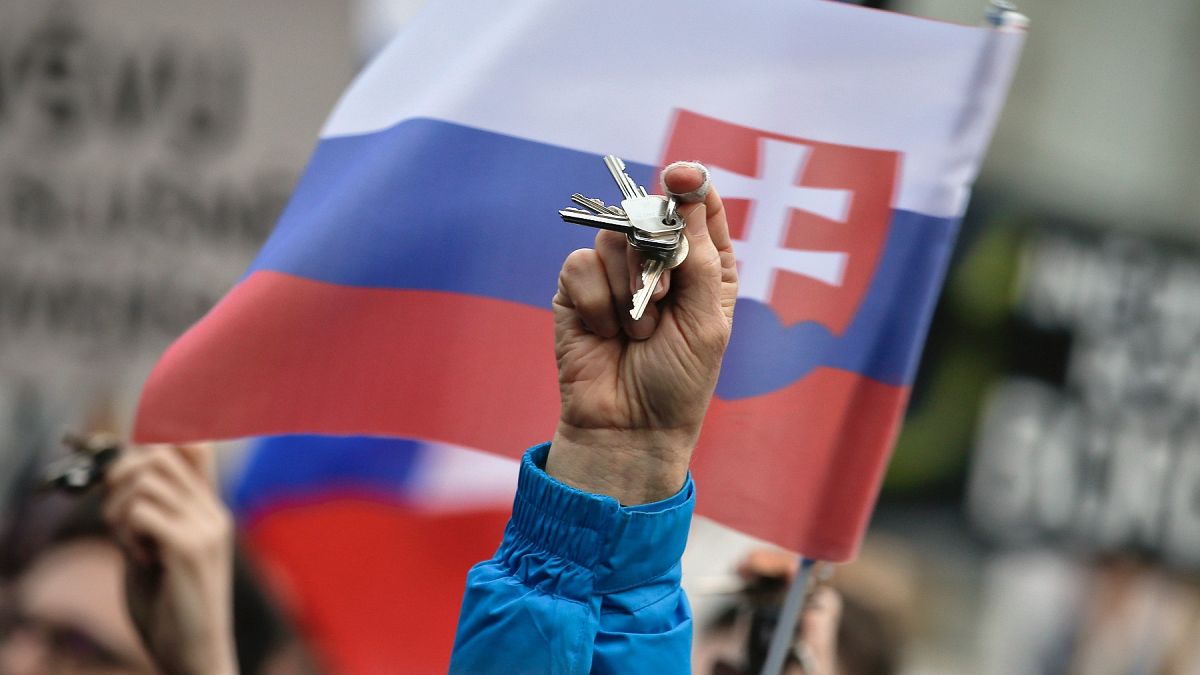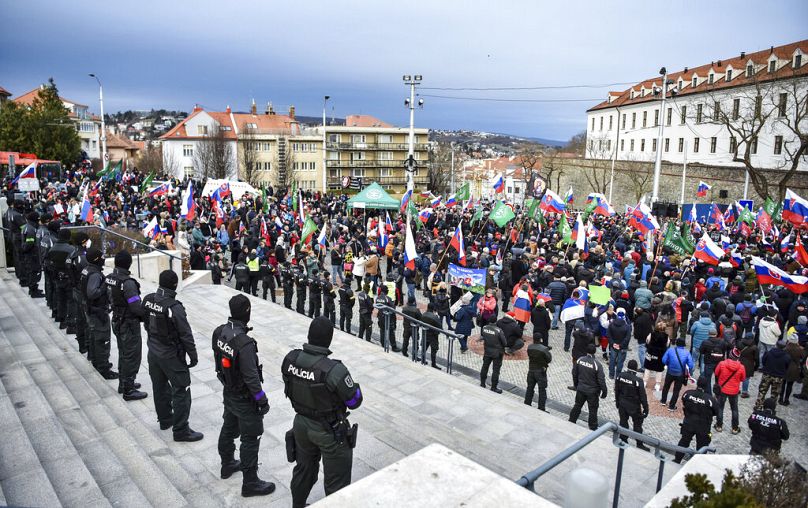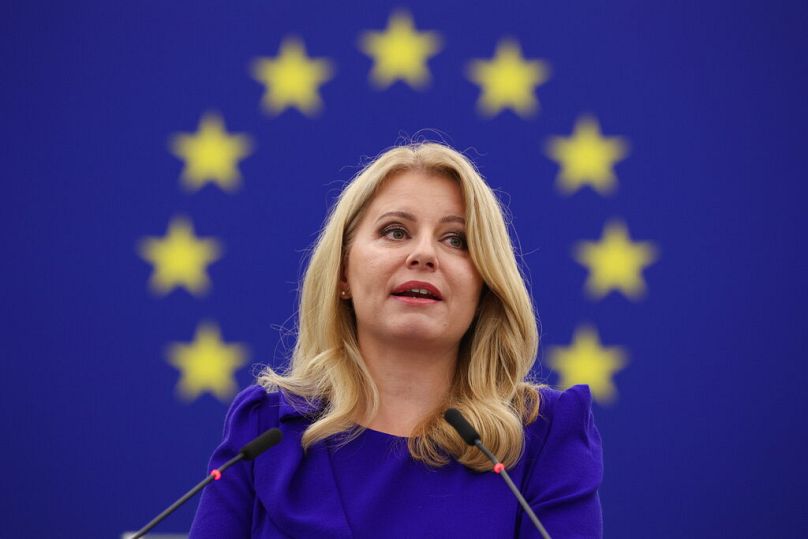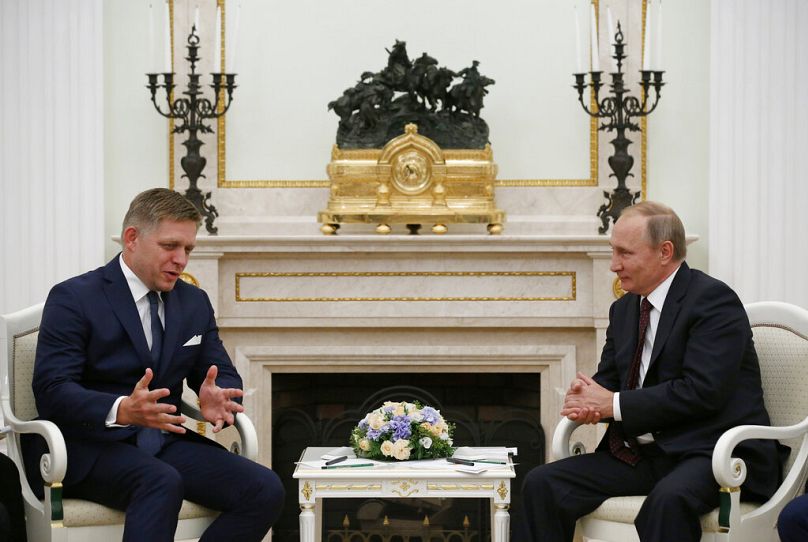The Russian Embassy's Facebook account in Slovakia has been deemed the most virulent in Europe. Yet Slovaks seem to like their Russian propaganda. Why?
The Russian embassy's official account in Slovakia is a conspiracy theorist's paradise.
Their Facebook page has amassed around 5,000 posts in just one year, featuring a range of content such as the bizarre and widely debunked theory that the US is controlling the spread of COVID-19 through international biolabs. It also features posts promoting tourist destinations in Russia, and even those calling Ukrainian President Volodymyr Zelenskyy offensive names.
The Beacon Project, an initiative by the International Republican Institute that tracks disinformation activities of Chinese and Russian embassies in Europe, has dubbed the account the most virulent diplomatic social media presence in Europe when it comes to undermining the Ukrainian war effort.
What's even more concerning is that the embassy could be reacting to popular demand, as Slovaks rank among the highest in the EU when it comes to pro-Russian stances.
"A lot of narratives about the decadent West and liberal democracy being a threat to our identity and culture resonate among Slovaks. Slovaks are also prone to believing various conspiracy theories, and with Bulgaria we are leaders in the EU when it comes to ascribing to Russian narratives," says Katarína Klingová, a senior researcher at the Bratislava-based Globsec think-thank.
In 2020, Globsec conducted a poll on the Slovak public's reactions to pro-Kremlin narratives and found that 78% of the public in the country believed they were traditional Slavic brothers with Russians, while seeing Russia as a key political and military force on the continent.
"The Russian embassy is very active both online and offline, especially at anniversaries of historical events - end of WWII, Slovak National Uprising, where they actively cooperate with the veterans, and organise commemoration events reminding Slovak of how Russia helped Slovakia in its history," explains Klingová.
Moscow's good boys
Independent local news outlet Dennik N secured video footage of pro-Russian journalists being co-opted by employees of the Russian embassy in Bratislava after the invasion of Ukraine last year and paid to promote Kremlin talking points.
In the video, Sergey Solomasov, the deputy military attaché at the embassy, is recorded telling a journalist working for Hlavné správy - a conservative Slovak paper that often runs pro-Russian articles - to target specific people in the country for its disinformation efforts.
The scene is not unlike similar ones featured in Russia-themed spy movies. The two men are seen walking through a seemingly empty forest, with Solomasov casually smoking a cigarette as he gives out his orders and the journalist nodding away.
“I told Moscow that you are a good boy… Moscow decided that you will be hunting two categories of people. First, the people [in Slovakia] who you know love Russia, who want to cooperate, who want money and who have confidential information.”
The second group Solomasov wants him to target are people who are on the fence about supporting Russia, and tells him to take them to sporting events or to restaurants.
Klingová explains that while three Russian diplomats were expelled from the country after the incident, the Hlavné správy journalist is only one piece in a wide network of disinformation sources.
There are estimated to be 253 disinformation-peddling and largely pro-Kremlin outlets in the country, and more than 1800 Facebook pages and open groups sharing pro-Russian propaganda.
“Pro-Kremlin narratives are also voiced by many domestic political leaders and parties, and some public representatives including the Prosecutor General of the Slovak Republic [Maroš Žilinka],” Klingová said highlighting that domestic politicians should also be blamed for this.
Slovakia is slated to hold elections later this year, and some political leaders have already started parroting rhetoric similar to that of Russian politicians such as talking points promoting an anti-LGBT agenda.
Pro-Putin peace marches
What is even more puzzling when it comes public attitudes in Slovakia is the fact that a large part of the government currently in power and the president are fiercely supportive of Ukraine.
“The government is completely in line with the rest of the EU and perhaps even more proactive than other countries, and our President Zuzana Čaputová is one of the staunchest supporters of Ukraine,” said Grigorij Mesežnikov, the president of the Institute of Public Affairs in Bratislava.
In sharp contrast to this, some citizens have been holding what they call "peace marches" or protests calling for an immediate end to the war and arms deliveries, and chant "Putin is our president, Putin is our hero!" at these events.
“I think they have somehow picked out Slovakia as the weakest in the chain of central European countries, where the conditions are the most favourable for spreading their propaganda,” said Mesežnikov.
Why the love for Russia?
Most people would lump Slovakia in with the rest of central Europe, where criticism of Russia and its policy is high – mainly due to the experience of 20th century wars and subsequent communist rule.
“Slovakia has deviated from other Central European countries when it comes to perceptions of Russia and public attitudes when it comes to the invasion of Ukraine,” explains Mesežnikov.
This is not merely a question of public attitudes, he insists, because Slovakia plays an important role in NATO security chain along Ukraine’s borders. Just last Friday, Slovakia delivered 3 Soviet-era MiG-29 fighter jets to the Ukrainian air force – which is crucial since Ukrainian fighters are trained to fly these planes.
If figures like former PM Robert Fico, who is against arms deliveries and often parrots pro-Russian ideas, get re-elected at the end of the year, this could seriously disrupt NATO’s plans for weapons deliveries.
According to Mesežnikov, “the agents of Russian influence in Slovakia are not marginal politicians or insignificant voices. Some of the most prominent politicians in Slovakia, such as the former speaker of parliament, are the most virulent supporters of Russia and Putin’s actions.”
He also warns that the signs of this undercurrent of blind Russian support has been present in public discourse in the country for centuries.
Going back to perhaps even the 19th century, Slovak leaders “dreamt about Russia as the protector of Slovakia and of all Slavic nations, especially the smaller ones. I think these notions were wrong at the time and continue to be, but they have unfortunately been inherited over many generations,” he explains.
“Unfortunately, all of this is bad for Slovak democracy. This rhetoric and these beliefs pull the country away from universal values and more towards insular values and ethnic politics,” concludes Mesežnikov.



